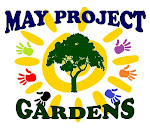 |
| Food forest garden |
We have had a few really good week in the garden recently. We have had quite a few visitors and volunteers passing through and they all love the site. Two weeks ago we managed to upgrade the paths in the food forest garden by putting down wood chip and the week after we made a wormery out of old used tyres and 'waste' chicken wire. We made these path by first digging out a low trench, lined it with cardboard then filled it in with the wood chip. We are very lucky to have friends at the Morden Hall Park who were generous enough to give us some of their excess wood chip.
 |
| Wormery made from old used tyres |
We have been making an effort to network with as many similar projects as possible, both locally and beyond. We now have a small plot at the amazing Dean City Farm in Merton Abbey and are very involved in helping to get their new allotment space up and running. Many people have been showing interest in what we do at the May Project Gardens, so we will be doing some short and long courses and workshops on Permaculture and various other sustainability topics in the near future. We have an experience Permaculture teacher who is willing to help make this happen. Another project we will be getting more involved with is The Peoples' Kitchen. This group addresses the problem of perfectly good food going to waste in the city of London by hosting weekly and monthly communal feasts.
 |
| Lemon Balm |
During this time of year we gardeners are beginning to see the fruits of our labour. Almost all the seeds sown at the beginning of the season are now ready to be planted out and perennial plants (those which come up year after year) are now showing substantial growth. We've got chives, thyme, rosemary, fennel, comfrey, rhubarb, lemon balm and a number of fruit bushes including black currents and red currents are developing fruit. Slugs and snails are a continual problem but we have been able to keep the majority of our crops safe from harm by putting down decoy barriers of cabbage leaves and going out hunting for them regularly. Recently we added some nematodes, which are microscopic natural predators of slugs and snails, to the garden and we wait to see if they really make any difference to the pests' population.
 |
| Spinach |
In the polytunnel we have been harvesting salads, leaf beet and lemon balm for a few weeks now. It really does pay to have a polytunnel in you garden, if you've got the space for it. It has allowed us to extend our growing season and it also helps with pest management. As it is an enclosed space the problems we get with pest under the polytunnel is much lower than the outdoor gardens. The only problem is keeping it watered. It gets hot in the polytunnel, very hot on some occasions and as a result the crops grow quicker but the ground dries out quite quickly. The mulch we put down has help but we really need to get our irrigation system up and running asap. The polytunnel is also the space we use to start off most of our seeds.
 |
| Third succession of seed sowing |
We sow seed in our seeds in a succession. We sow the first set of seeds early in the season, in February then a second set in late March then another set in mid to late April and so on. This technique ensures that we have a consistent supply of produce throughout the season and not ending up harvesting all our produce all at once. The polytunnel also allows us to still work in the garden even when the weather's not too friendly for outdoor work. On rainy days we sometimes retreat to the polytunnel and conduct other activities such as clay making.
 |
| Clay making session |
So food growing is not the only activity we get up to in the Garden. We are in the process of building a structure made from wooden pallets and other 'waste' materials, and earlier this week a few volunteers came down and we had a nice session making bird boxes, feeding tables and insect habitats all using 'waste' materials.
 |
| Bird boxes, table feeder, and insect habitat |
The project is growing and the skills and interactions gained as a result of getting involved with the May Project Gardens are invaluable. As we grow we welcome each and everyone to come we grow together. If you would like to get a taste of the May Project experience check out our website or give us a shout o on facebook and visit us at the garden on one of our open days. More information on courses and workshops will be published soon.



